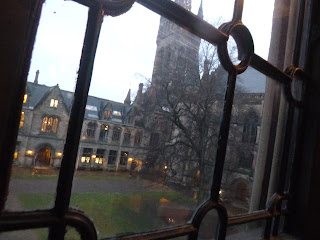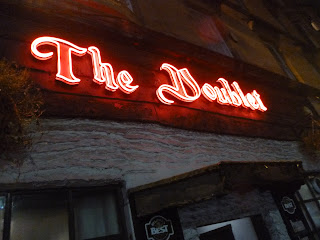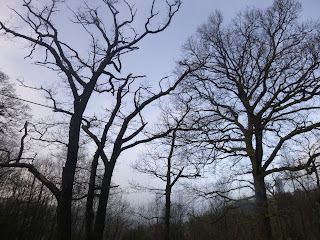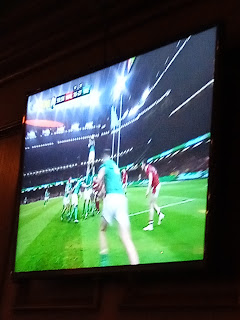“Tonight magic theater. Admission not for everyone. Only for... crazy people. Admission costs the mind.” - Hermann Hesse, Steppenwolf. The words hung over the entrance to the dance floor, where shirtless people were cavorted at the KitKat club, dancing the night before.
My bike was gone when I left.
But it was ok.
We all lose something here, hopefully finding something else.
Thomas Mann’s Doctor Faustus in hand, I caught the 6 PM flight to London, taking in the feeling in the air between Berlin and the road to Scotland, my destination for the next few days.
Robert Burns, their national poet, wrote about the night here:
“Upon that night, when fairies light
On Cassilis Downans dance,
Or owre the lays, in splendid blaze,
On sprightly coursers prance;
Or for Colean the rout is ta’en,
Beneath the moon’s pale beams;
There, up the Cove, to stray an’ rove,
Amang the rocks and streams….”
There would be a lot of that, in between to see, to understand, to imagine, just looking, thinking. These days, the road teaches like little else, even when I do spend the morning in classes, debating the fates of refugees and notions of crisis, real and imagined, constructed within short timelines and very real consequences. England famously voted to leave the European Union they petitioned to join, rejecting the stream of people coming their way from the East, the flux ever constant with lower tariffs and increased flow of laborers. This despite, their national hero, serving as an intellectual architect of the union after the second world war, when Churchill called for former rivals “to re-create the European family, or as much of it as we can, and to provide it with a structure under which it can dwell in peace, in safety and in freedom. We must build a kind of United States of Europe.”
A majority of Scottish voters wanted to remain in the EU, despite the national vote to leave, igniting new rounds of debate on independence. Majorities of voters seem to support independence, especially now that England’s fortress-like tariffs are resulting in isolation and economic stagnation.
It was the third anniversary of the final Brexit votes, when when I arrived.
In the line to the plane from London, I overheard two women, both wearing plaid I might add, talking. “What if it's an international border here?” one speculated. “Brexit. Groan. oh no. It might be one if Scotland leaves or goes back (to the EU).” Three years since Brexit, the New York Times noted no one was celebrating.
The clash is everywhere, but so are the possibilities, the lessons, the poems.
10:25 PM, I arrived in Edinburgh,the Scottish capital, finding my way to the 1030 bus.
It had been over a year since my last trip here.
“Does this take me to Cockburn 35/5?” I asked the bus drivers. Famously friendly, signs around town call for more “smilers,” with a photo of a similar bus driver, ostensibly white.
“Just to save you from embarrassing yourself, you don’t say the k,” said the amicable busdriver, the first of many.
“I’m beyond help,” I reply.
And off we drive, into the night, lights and a castle in the distance.
Half an hour later, we arrive in the old city center.
“You take a left and a right up the hill,” says the driver. And off I walk, out through curvy streets, people in and out of the ancient pubs, on side streets, eating chips, conviviality in the air, mixed with some of the harder edges after one too many whiskeys.
The gals, who have been here since Saturday, are mostly asleep when I arrive.
Everyone is looking for autonomy, me, the girls, the city, the country, connected, separate, hoping for a little space to breathe on our way to a few days zipping about the country.
To prepare for the trip, I read Portrait of An Artist as a Young Man, by Joyce, admittedly not a Scott. Still a story of someone finding themself attempting to reject oppressive social mores, in favor of more liberatory narratives, contending with desires, regret, ever searching for something of their own. “I will tell you what I will do and what I will not do. I will not serve that in which I no longer believe, whether it calls itself my home, my fatherland, or my church: and I will try to express myself in some mode of life or art as freely as I can and as wholly as I can, using for my defense the only arms I allow myself to use -- silence, exile, and cunning.”
The book pours through my mind that night, dreams racing.
Next morning, we wake up early and venture out to catch the 11:30 am train to Glasgow.
A cup of coffee and journal in hand, the train, windows open to the countryside, reminds us, it's gonna be a good trip.
Soon enough, we are in Glasgow, the less posh cousin, an hour out of Edinburgh.
Drop off our bags at our hotel outside the train station, and ask about lunch. “You need a cullen skink,” says one of the guys at the hotel.
“Hot soup, with some bread.”
“Perfect.”
Directions in hand, as we leave for lunch for our first of many bowls of Cullen Skink, a rich, creamy soup of smoked halibut, potatoes, and leeks. It is amazing. Like a chowder, with smoked meat, no bacon. Wow. Fining lunch, we stroll, past the industrial city, the graffitied city, the green city, full of used the bookstores, shuttered shops, colleges, kids in school blue jackets and plaid, to the college and the Hunterian Museum, full of ancient objects, and their lessons for history, poems inspired, relics of lives, ideas and revolutions. Can’t find a bus back, it's raining. So we stop at the pub, full of college students and locals. A few young bartenders serve us Guinesses, chatting, offering beer tips. The couple next to us have a poodle. They are hopeful about Scottish independence, telling us they opposed Brexit, like most Scotts. On we chat about their favorite comedians, stand up philosophers, altered images, Bob Dylan, college, god help the girl, a movie about Glasgow bands, the Mull of Kintyre that Paul sang about, and other adventures from Edinburgh to Glasgow, trips to the Islands to the East, where you can see as far as Ireland, they recommend. In “Tangled Up in Blue,” Dylan wrote about Montague StreetStreet,” says the elder man, over a pint. “We have a Montague Street here. So it makes us think he was writing about us,” he said with a laugh. It's a great city, he laughs.
He mentions Brexit with a groan. We were against it, he tells me. But there was nothing they could do. The fights over the measure have largely left the region in political paralysis, isolated.
Resentment over “British political elites …endorsing social liberalism, multiculturalism, and EU membership,” propelled the project, argues Pippa Norris, of Harvard Kennedy School; “working-class voters and older social conservatives held values that reflected a more authoritarian, xenophobic, and nativist response to immigration and EU membership.” Three years later, Britain still has to navigate a market, to pay to play, but without a vote. The reason countries remain in the block is it lowers tariffs on transactions, opening a market. With Brexit, Britain voted to increase tariffs and restrict flows of workers. “The I.M.F. only indirectly attributed some of Britain’s woes to Brexit,” says the New York Times, “noting that it suffered from a very tight labor market, which had constrained output. Brexit has aggravated those shortages by choking off the pipeline of workers from the European Union — whether waiters in London restaurants or fruit and vegetable pickers in fields.” Now it has a labor shortage and their economy is contracting. Could have seen that one coming.
Each day, more conversations sustain our journey, plans for adventures, chats with ever amicable Scots about the ancient histories. In a wool three piece suit, his hair pulled back, a maitre de at breakfast tells us stories about his life in Glasgow with his wife, from Mexico, who is writing her dissertation on difference in the work of JRR Tolkein. He tells us about an old song:
“You’ll take the high road and I”ll take the low.
And I'll be in Scotland afore ye
Where me and my true love will never meet again
On the bonnie bonnie banks of Loch Lomond.”
Discussing historical sites, he writes down a list of a few places with the ancient stone piles in Kinnell, a few hours away. And off we whirl, stopping to take in the collection at the Kelvingrove museum before making our way out of town, through the drizzle, a rainbow appearing in the distance, past milltowns, kids eating chips after school, and green hills. Finally, we stop for another Cullen skink soup, conspiring about independence, with another amicable water. At lunch, we unpack more stories of the Argentine writer, Jorges Luis Borges, who loved to travel through the highlands, calling Nessie Grumdel, after the creature in Beowulf. Is he real? Any Nessie sightings, I ask the waiter, Caroline and the Bear turning red. The bartender grins and speculates if there were prehistoric creatures in the Loch here, we all might know it. What about independence I ask. He tells me his dad said it would be hypocritical if Scotland left one union in the UK to re join another in Europe. Why I wonder. A majority wanted to stay in Europe. Not sure a majority ever agreed to join the UK in the first place. Venting about covid lockdowns and former Prime Minister Liz Truss’ short lived economic plan, he worries the UK will be in a recession for a generation. Others agree with his sentiment. Says Reuters: “Britain is engulfed in a political crisis akin to the industrial battles of the 1970s, the sterling crash of the early 1990s and the chaos that followed Brexit. Since it voted to leave the European Union in 2016 it has lost three prime ministers and its reputation as a predictable member of the global economic order.”
Finishing our cullen skink, we bid everyone goodbye and hit the road for the stones.
Swirling down small curvy roads, passenger side to the curve, through more and more rain, getting worse and worse, muddier and muddier. By the time we hit a mill and waterfall, we scrap our plans to find the fabled stone piles and make our way to our inn, the Karma on the Lake in Stirling, for a few pints and dinner. More stories, a few Robert Burns poems, banter about the Dark Crystal remake. I wonder about our family history and its tenuous ties to this place. A deserter from Hess and a bastard from Scotland, those are our relatives, I recall from stories. But was she from Scotland? According to Uncle Bruce this all, “sounds like Jack embellishing the story I heard: a scullery maid impregnated by a German Duke came to the USA to bear my Bastard grandfather.” And that was my great grandfather, the mother of my grandmother on Dad’s side. DNA tests show a lot of English, Irish blood. Not much in the way of German, I think later that night. The line between family narrative and fact is a blurry one.
That night, more dreams, a strange American I don’t know, not invited, blocking the conversation over dinner, with incessant banal lefty chatter. Who invited him?
Carson and Trey are discussing Siddhartha. “What inspired you to read it again?” he asked Caron. “It hits dif at 53 than at 17.”
“The river is everywhere,” says Trey, referring to the story.
“One must find the source within one's own Self, one must possess it. Everything else was seeking -- a detour, an error.”
Still miss you Trey, gone a year now, but still so around.
Thanks for the cameo.
More fog, walks in the woods, reflections in the water, trees in the history, through the history of the Lochs and Islands, taking in the fresh air, the smell of burning wood, the fog and shadows, reflections in the water, skipping stones, hiking all day long. We stop for more soup and a chat, admiring the taxidermy fish and antlers in the old lodge, before making it out to the trail. Stumbled into an abandoned castle, abandoned since 1952, plants taking over civilization, taking over the walls, the ceilings, open to the sky the rain, majestic ruins, like Anngkor Wat.
Back to the lake, to the cemetery, more lives, a pint and a fire.
Over dinner, we chat with our Australian friends, who suggest we visit Sofia in Bulgaria, or possibly Pozan, Poland, or Skopje, Macedonia, and the Tomovi Guesthouse in Plovdiv. They love the East, traveling there as much as they can, particularly since they both retired and sold their house in exchange for full time life on the road, as long as they have each other, 38 years of marriage later, still at it.
The teenager lampoons my blog style and verb choice, overuse of walking, chatting, and hanging, perhaps loafing about in my writings.
“Loafing through History,” I say.
“That should be the new blog title.”
I read late into the night, taking in stories of Cervantez and the pirates, Goethe in Sicily, fictions of lives, stories of ourselves.
Next morning, we drive out to St Andrews, abandoning the journey halfway there, to make it to the airport on time. After a week of exploring crumbling castles, hiking the West Highland way, meeting old trees, greeting sheep, listening to Kate Bush, smelling peat burn, chatting about poetry and history, we got to the airport in time to catch the last 15 minutes of Wales Vs Ireland in the six nation rugby tourney with two of my three bffs, missing the now teenager in Los Angeles. Planes late, we catch Scotland beat England, with a whole group of fans. What a trip, everyone met at the pub at our little inn on the loch, the Aussies telling travel stories, sharing travel tips. What a week. Not an ugly moment as we made our way from cities to the country.
Back to Berlin, back to history, back to the Steppenwolf and the KitKat, Berghain and the Clärchens Ballroom. Back to Thomas Mann and Dr Faustus.
“Ruin masses above Germany, rats grow fat on corpses inhabit the rubble of our cities, the thunder of Russian tanks rolls on towards Berlin… and end is come. End is come… My tale hastens toward an end as does everything…”






























































































































































































































































































































No comments:
Post a Comment